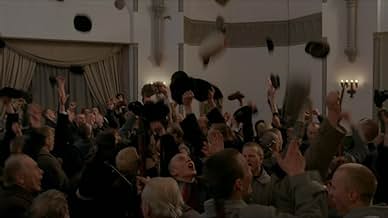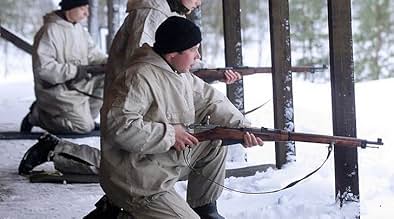Nimed marmortahvlil
- 2002
- 1 h 35 min
AVALIAÇÃO DA IMDb
7,0/10
2,4 mil
SUA AVALIAÇÃO
Esse filme é sobre a Guerra da Independência da Estônia (1918-1920), especificamente sobre os estudantes que lutaram no lado nacionalista, mas também mostra o conflito entre duas ideologias ... Ler tudoEsse filme é sobre a Guerra da Independência da Estônia (1918-1920), especificamente sobre os estudantes que lutaram no lado nacionalista, mas também mostra o conflito entre duas ideologias (nacionalismo estoniano e comunismo).Esse filme é sobre a Guerra da Independência da Estônia (1918-1920), especificamente sobre os estudantes que lutaram no lado nacionalista, mas também mostra o conflito entre duas ideologias (nacionalismo estoniano e comunismo).
- Direção
- Roteiristas
- Artistas
- Prêmios
- 1 indicação no total
Hele Kõrve
- Marta
- (as Hele Kõre)
Bert Raudsep
- Käämer
- (as Bert Raudsepp)
- Direção
- Roteiristas
- Elenco e equipe completos
- Produção, bilheteria e muito mais no IMDbPro
Avaliações em destaque
5Jan_
Ladies and gents, the most overrated Estonian movie of all times. Yes - it is at times warm and touching, it boasts splendid cinematography, it lacks the daft, aggressive jingoism painfully present in most patriotic flicks (read: American ones) and is not exaggerated like the aforementioned usually tend to be.
So "Names In Marble" is not a bad movie per se. Having said that, there are things that add up to a heavy reduction in its overall value.
I personally found it irritating how Elmo Nüganen had chosen to ignore Albert Kivikas' novel and write an insipid and even quite cheesy plot riddled with holes. Nüganen obviously failed to decide whether to make a pompous war epic or a minimal, realistic drama. So he chose both. I don't know what my fellow countrymen sought in the movie; I myself found the overdramatized battle scenes (rip-offs from Saving Private Ryan, mind you) to be painfully out of place. As well as the romantic sub-plot which didn't exist in the novel in the first place. But since action and/or romance are the things that mainly appeal to an average moviegoer, you'd simply _have_ to include both - and ruin excellent script material in the process. Quite sad.
The acting is OK, but just that. No, there is nothing tearjerking in this movie, sorry to say so. Yes, the subject matter is extremely personal to us Estonians, but I found the novel a thousand times more touching and thought-provoking than this "blockbuster". And if you think that this is the very defining moment in Estonian cinematography, think again.
Oh, well. Without further ado: if you're an Estonian or a non-Estonian pathologically fascinated with local culture, and haven't yet seen the movie - go and see it, although be warned: you haven't missed anything. Otherwise do this: look up Olli Saarela's "Rukajärven tie", a splendid recent addition to a fine series of Finnish war dramas ("Talvisota", "Tuntematon sotilas"). Because while "Names in Marble's" only significant value stems from its patriotic sting, "Rukajärven tie" is actually a cinematic achievement in the best sense of the term.
So "Names In Marble" is not a bad movie per se. Having said that, there are things that add up to a heavy reduction in its overall value.
I personally found it irritating how Elmo Nüganen had chosen to ignore Albert Kivikas' novel and write an insipid and even quite cheesy plot riddled with holes. Nüganen obviously failed to decide whether to make a pompous war epic or a minimal, realistic drama. So he chose both. I don't know what my fellow countrymen sought in the movie; I myself found the overdramatized battle scenes (rip-offs from Saving Private Ryan, mind you) to be painfully out of place. As well as the romantic sub-plot which didn't exist in the novel in the first place. But since action and/or romance are the things that mainly appeal to an average moviegoer, you'd simply _have_ to include both - and ruin excellent script material in the process. Quite sad.
The acting is OK, but just that. No, there is nothing tearjerking in this movie, sorry to say so. Yes, the subject matter is extremely personal to us Estonians, but I found the novel a thousand times more touching and thought-provoking than this "blockbuster". And if you think that this is the very defining moment in Estonian cinematography, think again.
Oh, well. Without further ado: if you're an Estonian or a non-Estonian pathologically fascinated with local culture, and haven't yet seen the movie - go and see it, although be warned: you haven't missed anything. Otherwise do this: look up Olli Saarela's "Rukajärven tie", a splendid recent addition to a fine series of Finnish war dramas ("Talvisota", "Tuntematon sotilas"). Because while "Names in Marble's" only significant value stems from its patriotic sting, "Rukajärven tie" is actually a cinematic achievement in the best sense of the term.
The record-making, dazzling and thrilling Estonian blockbuster `Names in Marble' has brought nearly 150,000 people all over the country out of their comfortable homes to see something that takes your breath away.
The story evolves around a group of young schoolboys who decide to alter the course of history once and for all - to fight against the Soviet army and for the freedom of the new Republic of Estonia.
`Names in Marble' opens a doorway to a new dimension of Estonian cinema. Directed by Elmo Nüganen who is famous for his interpretation of many classical plays in several theatres in Estonia, the movie has a unique sense of closeness and significance that is not common for other Estonian movies. Nüganen adds another flavour to the picture by hiring the well-known Russian cameraman Sergei Astakhov to record the key scenes and arrange the almost perfect cinematography of the movie.
Another astonishment that the moviegoers might experience is the great work of some young and promising Estonian actors. The sincerity and clarity of the leading role, played by Priit Võigemast represents the possibilities and potential of Estonian cinema in reaching an international level.
It is unfortunate that the best yet Estonian movie has absolutely has no chance of getting a nomination for the `Best foreign film' Academy award - it lacks a certain multi-cultural perspective.
In the end it brought tears to the eyes, it did matter and it made us sit in the theatre until all the credits were shown and lights came on, reminding us how important it is to be who we are.
The story evolves around a group of young schoolboys who decide to alter the course of history once and for all - to fight against the Soviet army and for the freedom of the new Republic of Estonia.
`Names in Marble' opens a doorway to a new dimension of Estonian cinema. Directed by Elmo Nüganen who is famous for his interpretation of many classical plays in several theatres in Estonia, the movie has a unique sense of closeness and significance that is not common for other Estonian movies. Nüganen adds another flavour to the picture by hiring the well-known Russian cameraman Sergei Astakhov to record the key scenes and arrange the almost perfect cinematography of the movie.
Another astonishment that the moviegoers might experience is the great work of some young and promising Estonian actors. The sincerity and clarity of the leading role, played by Priit Võigemast represents the possibilities and potential of Estonian cinema in reaching an international level.
It is unfortunate that the best yet Estonian movie has absolutely has no chance of getting a nomination for the `Best foreign film' Academy award - it lacks a certain multi-cultural perspective.
In the end it brought tears to the eyes, it did matter and it made us sit in the theatre until all the credits were shown and lights came on, reminding us how important it is to be who we are.
7jnk9
While many of us know the general outlines of World War I and of the fate of the Baltic republics up until their regained independence in the early 1990's, this movie is a valuable addition of flesh and blood to a complicated historic phase: the fight for the Estonian territory. Among the fighting parties: Estonians, "red" Soviet Russians, "white" Russians, Germans, Finns and Latvians. Add to this youthful idealism, a light romantic episode and lots of atmosphere and you will agree that it is well worth its 90 minutes.
The film is especially interesting to anyone with an interest in World War I, Soviet/Russian history or the Baltic region but just as much to anyone interested in more nuanced war/ action films.
The film is especially interesting to anyone with an interest in World War I, Soviet/Russian history or the Baltic region but just as much to anyone interested in more nuanced war/ action films.
Estonians see this film in a little different light than the other people. As a Finn I think Estonians should be proud of this film even if it's not necessarily even a great movie in pure artistic sense. I watched this film with sentiment and that's why I rate it so high. Estonian history concerns us Finns too and we're sorry that you suffered from Russian rule for so long time. We Finns are also happy that you managed to fend off the Red Army in 1918, for their next target would definitely been Finland. The Red Danger was over only in 1920 with the Tarto Treaty, which meant the end of enmities with the Soviet Union. That treaty was signed by both Finns and Estonians and one Finnish General has said that it was only that contract that ended the Finnish Civil War too. He meant that the Estonian war for Freedom was a part of Finnish war for Freedom as well.
I consider 'Nimed Marmortahvlil' as a very interesting movie and I don't think many Finns will disagree with me. The film has been broadcast in Finland twice and I have it on DVD, because it has a special value for me. I confess I might like it less if Peter Franzén had not played in the film. I also admit that the action scenes are not very great: there are over-acting and over-dramatizing but using that ancient light machine-gun in the final battle is interesting. The informal nature of the Estonian army is also notable as they all were just young volunteers without any military training. The action also happens in a minor scale, there is no real epic, and the event frame is somewhat odd to me. I don't figure out what the clock is symbolizing and what are those Latvians doing in Estonia except fighting, of course. Well, I guess the clock symbolizes the battle for Freedom in some sense and the Latvians are fighting for the Communism and not for Latvia. Despite these 'grand mysteries' I find this film very special.
I consider 'Nimed Marmortahvlil' as a very interesting movie and I don't think many Finns will disagree with me. The film has been broadcast in Finland twice and I have it on DVD, because it has a special value for me. I confess I might like it less if Peter Franzén had not played in the film. I also admit that the action scenes are not very great: there are over-acting and over-dramatizing but using that ancient light machine-gun in the final battle is interesting. The informal nature of the Estonian army is also notable as they all were just young volunteers without any military training. The action also happens in a minor scale, there is no real epic, and the event frame is somewhat odd to me. I don't figure out what the clock is symbolizing and what are those Latvians doing in Estonia except fighting, of course. Well, I guess the clock symbolizes the battle for Freedom in some sense and the Latvians are fighting for the Communism and not for Latvia. Despite these 'grand mysteries' I find this film very special.
The movie is nice, if you want to give it a credit just because it is one of the rare chances to see Estonian cinema. It is touching and somewhat sentimental, though the director managed to avoid too cheesy holliwoodish scene. The main plus is the touching feeling it evokes when you think about those young lads who got in the civil war and have to fight the outnumbering enemy. There is a love story, beautiful girl, but nothing really happens. There is a token brother-against-brother theme, that is supposed to show the brutal nature of the civil war. There are battle scenes, but the main battle scene against Latvians is too over dramatized and extremely unrealistic. In general, it's OK if you don't start thinking how in reality those battles would be possible. If you start thinking it seems extremely surrealistic and devoid of any resemblance of what the battle would be in the real war. Thus, some 10 young students lying in the half trench seem to stop the whole company of mighty Latvian Reds (those guys hugely contributed to the victory of REds in Russia). The movie ends abruptly, and you have a feeling that something is missing. As for historical part, it's interesting that most Estonian/Finnish spectators immediately see it as us (Estonians) fighting them (Evil Russians). The movie itself doesn't really show much Russians. Most Reds are actually Estonian. Another thing is that the Civil war in Estonia (and Finland) is often presented as Liberation war, while in fact it was a Civil war. Russians played a minor role in both countries. And it was a part of one giant civil war going on in the whole disintegrating Russian empire with Reds fighting Whites. So the words appearing in the beginning of the movie and saying that Soviet Russia wanted to establish itself as a European power (implying that Soviet Russia invaded Estonia) have more to do with current Estonian political situation than with the history.
Você sabia?
- Erros de gravaçãoThere's a surfaced road in one scene, but in Tartu in 1918 there were no tarmac roads.
- ConexõesFeatured in Welcome to Estonia (2002)
Principais escolhas
Faça login para avaliar e ver a lista de recomendações personalizadas
Detalhes
- Data de lançamento
- Países de origem
- Centrais de atendimento oficiais
- Idiomas
- Também conhecido como
- Names Engraved in Marble
- Locações de filme
- Empresas de produção
- Consulte mais créditos da empresa na IMDbPro
Bilheteria
- Orçamento
- EEK 24.000.000 (estimativa)
- Faturamento bruto mundial
- US$ 83.112
- Tempo de duração1 hora 35 minutos
- Cor
- Mixagem de som
- Proporção
- 1.85 : 1
Contribua para esta página
Sugerir uma alteração ou adicionar conteúdo ausente






















